skip to main |
skip to sidebar
Last night Karen, David and I had a profoundly moving experience at Chicago Lyric Opera. The occasion was a performance of Mieczyslaw Weinberg's The Passenger, which was having it's local premiere at the opera house.
The opera and the composer were unknown to me until last night, but judging by the amazing work we heard, we'll be hearing a lot about him in the future. He was a Polish Jew who went to Russia, was a friend of Shostakovitch, and a prolific composer. He was out of favor with Stalin, was put in prison, and would have been killed, had not Stalin died at that moment.
The opera was written in 1968, based on a story by Zofia Pomysz. It details a trip on board ship from Germany to Brazil. Walter and Liese are going to Brazil where he will have a position in the German embassy there. Liese sees a woman on the ship she recognizes as someone she supervised at Auschwitz when she was an SS officer during the war. As far as she knows, she sent the woman to her death. They both fear that if this woman recognizes Liese, it will ruin their position in Brazil.
The opera goes back and forth from the ship in 1968 to the concentration camp during the war. A very creative set is divided between a balcony, which is the deck of the ship, and the main stage which is the concentration camp. Everything on the ship is white, the set, the costumes, all gleaming white. The concentration camp is all dark and ominous.
The music is amazing. Jagged but lyrical lines for the singers, wonderful orchestration for the orchestra.
The cast was superb. Brandon Jovanovich sang the role of Walter with a strong, almost Helden tenor voice. Liese was sung by Davida Karanas, with a rich spinto soprano, Marta was performed by the amazing Amanda Majeskie, whose soaring high passages shone, and Tadeusz was sung by Joshua Hopkins. The rest of the very large cast was excellent.
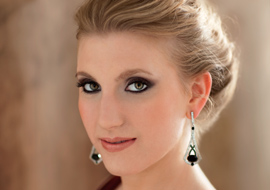 Davida Karanas
Davida Karanas
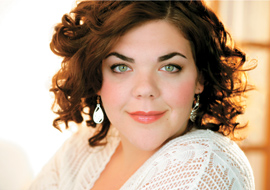 Amanda Majeski
Amanda Majeski
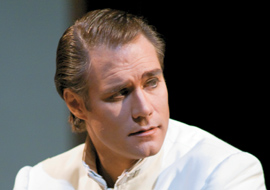 Brandon Jovanovich
Brandon Jovanovich
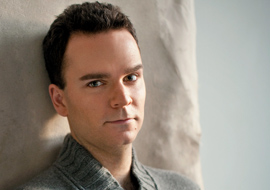 Joshua Hopkins
If you are in the Chicago area, this is a production you must see, a major unknown work by a major unknown composer that is riveting.
Joshua Hopkins
If you are in the Chicago area, this is a production you must see, a major unknown work by a major unknown composer that is riveting.
Tonight David and I saw a concert by Music of the Baroque. It was conducted by Jane Glover. This woman never makes a gesture that does not have musical meaning. It is as if she has completely digested whatever work she is conducting and transmits it through her hands and fingers directly into the minds and instruments of her orchestra. If I didn't know better, I would say it is magic.
Well, maybe it is. I have never seen a conductor express a score as beautifully as this woman. She is the very best.
 Tonight she led the orchestra in Concerto Grosso in C Major (Alexander's Feast), and the Symphony No. 34 in C Major by Mozart. The orchestra follows her slightest gesture with apparent delight, producing fabulous music. The music dances in her hands.
The soloist tonight was soprano Susanna Phillips- or 'Diva! Susanna Phillips', as she was billed in the program.
I don't think so.
Tonight she led the orchestra in Concerto Grosso in C Major (Alexander's Feast), and the Symphony No. 34 in C Major by Mozart. The orchestra follows her slightest gesture with apparent delight, producing fabulous music. The music dances in her hands.
The soloist tonight was soprano Susanna Phillips- or 'Diva! Susanna Phillips', as she was billed in the program.
I don't think so.
 The voice was not particularly beautiful. Her coloratura worked well in the higher registers but disappeared when she went into the middle and lower parts of her voice. She had high notes, but they were often pushed and sometimes off pitch. She let out one yelp at the end of the Mozart Concert aria that made me jump. The audience seemed to feel that she was wonderful, so I guess I'm just a picky old voice teacher.
She opened with several arias and recitatives from Giulio Cesare of Handel. Then sang the Scena di Berenice by Haydn, ending with the Concert aria "Bella mi fiamma' of Mozart. That's where the yelp happened.
I had worked the Berenice with Lorraine years ago and she performed it with the Boston Symphony. The work was just in too low a tessitura for Ms. Phillips. She couldn't begin to bring it off. Lorraine was a Mezzo-soprano and Ms. Phillips is a soprano. Two very different voices, both in range and musical ability. There was no contest.
I wish I could convince lady singers to stop wearing strapless gowns when then perform. They are very beautiful, but with the corseting required to hold the dress up, they make it impossible to get a low breath. I think that this may have had something to do with her vocal problems tonight. Get a dress that flows and allows you to take a deep singing breath. Trust me, you will sing a lot more easily and beautifully.
She also changed dresses for the second part of the program, both very pretty. Both very tight in the waist. One fuschia and one blue. I thought sopranos only changed gowns in mid-concert when the voice had fled. Oh well...
But the night was really Jane Glover's. She is simply the best!
The voice was not particularly beautiful. Her coloratura worked well in the higher registers but disappeared when she went into the middle and lower parts of her voice. She had high notes, but they were often pushed and sometimes off pitch. She let out one yelp at the end of the Mozart Concert aria that made me jump. The audience seemed to feel that she was wonderful, so I guess I'm just a picky old voice teacher.
She opened with several arias and recitatives from Giulio Cesare of Handel. Then sang the Scena di Berenice by Haydn, ending with the Concert aria "Bella mi fiamma' of Mozart. That's where the yelp happened.
I had worked the Berenice with Lorraine years ago and she performed it with the Boston Symphony. The work was just in too low a tessitura for Ms. Phillips. She couldn't begin to bring it off. Lorraine was a Mezzo-soprano and Ms. Phillips is a soprano. Two very different voices, both in range and musical ability. There was no contest.
I wish I could convince lady singers to stop wearing strapless gowns when then perform. They are very beautiful, but with the corseting required to hold the dress up, they make it impossible to get a low breath. I think that this may have had something to do with her vocal problems tonight. Get a dress that flows and allows you to take a deep singing breath. Trust me, you will sing a lot more easily and beautifully.
She also changed dresses for the second part of the program, both very pretty. Both very tight in the waist. One fuschia and one blue. I thought sopranos only changed gowns in mid-concert when the voice had fled. Oh well...
But the night was really Jane Glover's. She is simply the best!
I am just back in Chicago after a wonderful month in Spain. While I was there I got this email from a friend in Holland who has been reading some of my books. I thought that I would answer him in this way in the event that others would be interested in what I have to say.
Here is his email to me:
'Dear Herbert Burtis,
As a present i, again, got a cd of Lorraine Hunt
Lieberson, how wonderfull. I always am amazed by her vocal ease. As you were
her teacher what, besides being an exceptional musician, was it she did? Was
it a technical feature? Did she do everything you write about singing right?
What were her strongpoints and did she have any weakness?
Maybe a nice
idea for a post.
Your aw-breath has done wonders for my singing, thank
you for that.
Greetings,
Robert'
 It has been nearly ten years since Lorraine died. July 3, 2006. She had been ill for a long time with the affects of cancer but kept singing wonderfully right up to the last few months of her life. I heard her sing The Neruda Songs by Peter Lieberson, her husband (who died several years after she did) in March 2006 with the Boston Symphony Orchestra. Somehow, she was able, although in poor health, to bring everything together in the performance, as she always did. It was wonderful to hear her sing these magnificent songs, written for her by her husband, who loved her beyond belief. I believe her very last performance was the Mahler Second Symphony with the Chicago Symphony.
To answer Robert's questions-
1. Yes, she was an amazing musician. In every way. She had also been a professional violist before her singing career took over her life. She said that at one point her viola was stolen and she took that as a sign she'd better stick to singing.
2. Technically she learned to use her amazing instrument with great ease and, of course, incredible musicianship. When she started working with me, twenty years before her death, she had been having trouble with high notes. At that point she was being billed as 'Soprano-Mezzo-Soprano' by Colbert, her then agent. Most of the soprano roles she sang were in Baroque music and were sung at low pitch. After we had worked together for several years, she had to sing a Messiah with the San Francisco Symphony; the soprano role. Singing with her in that performance was Nathaniel Watson, who had sent her to study with me. Nat has also worked with me for many years and has a busy career as a baritone in Canada and the USA. This performance was to be performed at modern pitch, which is almost a half step higher than Baroque pitch. We spent a lot of time working on it so that she could perform it with ease. I did not hear the performance, but she was unhappy with the way it went and Nat agreed that she was not at her best. Shortly after that we had a talk and I told her 'I think you need to decide what you are. I think you are a Mezzo.' She replied 'So do I!'. And that was that. As she matured her voice became larger and darker while still retaining the high C. It was after that time she had her greatest successes.
3. As far as doing everything I have written about, I guess she did. In lessons if she was having a problem, we would stop and I would suggest an easier way to sing the passage. If my first suggestion didn't work, we'd try another one. Once the problem was solved, she would repeat the new method many times in a row immediately. Later, when hearing her sing the passage in a performance, she would sing it exactly the same way. In this way any weakness she was exhibiting would be corrected. She had the ability to try a new technique, a new way of singing something, and make it her own.
It has been nearly ten years since Lorraine died. July 3, 2006. She had been ill for a long time with the affects of cancer but kept singing wonderfully right up to the last few months of her life. I heard her sing The Neruda Songs by Peter Lieberson, her husband (who died several years after she did) in March 2006 with the Boston Symphony Orchestra. Somehow, she was able, although in poor health, to bring everything together in the performance, as she always did. It was wonderful to hear her sing these magnificent songs, written for her by her husband, who loved her beyond belief. I believe her very last performance was the Mahler Second Symphony with the Chicago Symphony.
To answer Robert's questions-
1. Yes, she was an amazing musician. In every way. She had also been a professional violist before her singing career took over her life. She said that at one point her viola was stolen and she took that as a sign she'd better stick to singing.
2. Technically she learned to use her amazing instrument with great ease and, of course, incredible musicianship. When she started working with me, twenty years before her death, she had been having trouble with high notes. At that point she was being billed as 'Soprano-Mezzo-Soprano' by Colbert, her then agent. Most of the soprano roles she sang were in Baroque music and were sung at low pitch. After we had worked together for several years, she had to sing a Messiah with the San Francisco Symphony; the soprano role. Singing with her in that performance was Nathaniel Watson, who had sent her to study with me. Nat has also worked with me for many years and has a busy career as a baritone in Canada and the USA. This performance was to be performed at modern pitch, which is almost a half step higher than Baroque pitch. We spent a lot of time working on it so that she could perform it with ease. I did not hear the performance, but she was unhappy with the way it went and Nat agreed that she was not at her best. Shortly after that we had a talk and I told her 'I think you need to decide what you are. I think you are a Mezzo.' She replied 'So do I!'. And that was that. As she matured her voice became larger and darker while still retaining the high C. It was after that time she had her greatest successes.
3. As far as doing everything I have written about, I guess she did. In lessons if she was having a problem, we would stop and I would suggest an easier way to sing the passage. If my first suggestion didn't work, we'd try another one. Once the problem was solved, she would repeat the new method many times in a row immediately. Later, when hearing her sing the passage in a performance, she would sing it exactly the same way. In this way any weakness she was exhibiting would be corrected. She had the ability to try a new technique, a new way of singing something, and make it her own.
As far as I am concerned, there is no other mezzo-soprano of the current generation who can compare to her.
But I may be prejudiced.
This evening David and I heard a lovely program of music for Chorus and Brass presented by Music of the Baroque, directed by William Jon Gray. Mr Gray is the regular conductor of the group and prepares the chorus for appearances by our favorite conductor in the world, Jane Glover. Mr. Gray is no slouch! He conducted a varied program with energy and sensitivity in the wonderful space of St. Michael's Church in Old Town, Chicago.
 The chorus sounded fine; much better than at last year's holiday concert under a different conductor. Mr. Gray and Ms. Glover apparently agree on the sort of sound a choir should make.
There was also en excellent brass ensemble, a wonderful 'cellist, Barbara Haffner, and a fine organist, Mark Shuldiner. Vocal solos were taken by members of the chorus. I especially liked the work of baritone Kevin Keys.
The repertoire ranged from the likes of Gabrieli, Victorio, and Monteverdi to Jean Berger and Tarik O'Regan (whose work I especially liked).
It was a fine concert in a wonderful room, both visually and acoustically.
The chorus sounded fine; much better than at last year's holiday concert under a different conductor. Mr. Gray and Ms. Glover apparently agree on the sort of sound a choir should make.
There was also en excellent brass ensemble, a wonderful 'cellist, Barbara Haffner, and a fine organist, Mark Shuldiner. Vocal solos were taken by members of the chorus. I especially liked the work of baritone Kevin Keys.
The repertoire ranged from the likes of Gabrieli, Victorio, and Monteverdi to Jean Berger and Tarik O'Regan (whose work I especially liked).
It was a fine concert in a wonderful room, both visually and acoustically.

This afternoon David and I attended an Advent Vespers service at the Monastery of the Holy Cross. We actually thought it was going to be a concert by the Chicago Chorale, and they were represented by a group of 12 singers who sang very well in a few pieces. They were basically appearing as the church choir.
Most of the singing, however, was performed by the monks of the Abbey. They performed the service, singing plainchant in Latin. I had thought that after Vatican II, most English speaking Catholic churches used English for the services. However...
The monks sang very nicely, processing with incense, wandering all about the church.
 Tomas Luis de Victoria
The small group from the Chicago Choral, about 6 men and 6 women, sang very well choral music of Tomas Luis de Victoria. The conductor is Bruce Tammen. Mr. Tammen has an unusual technique of conducting this type of music. Everything is a downbeat.
Tomas Luis de Victoria
The small group from the Chicago Choral, about 6 men and 6 women, sang very well choral music of Tomas Luis de Victoria. The conductor is Bruce Tammen. Mr. Tammen has an unusual technique of conducting this type of music. Everything is a downbeat.
All in all it was an interesting experience.
This afternoon David and I heard a program presented by the Fourth Coast Ensemble, Karen Ann Bacon, soprano, Bridget Skaggs, mezzo-soprano, Zachary Vanderburg, tenor, Reuben I. Lillie, baritone, Luciano Laurentiu, piano and organ, Stephanie Bouwsma and Maria Storm, violins, and Jennifer Ruggieri, harp.
 Karen Ann Bacon
Karen Ann Bacon
 Bridget Skaggs
The program loosely followed the various sections of the Magnificat, with compositions from composers as different as Georg Philipp Telemann to Samuel Barber with various degrees of success.
Bridget Skaggs
The program loosely followed the various sections of the Magnificat, with compositions from composers as different as Georg Philipp Telemann to Samuel Barber with various degrees of success.
 Zachary Vanderburg
Mr. Lillie has a fine baritone voice with a good, easy top. He has excellent diction. The other singers had basically good voices with areas that could stand improvement. They used music for the most part of the program, which places a barrier between the singer and the audience. The program would have a more professional feel with a memorized presentation.
Zachary Vanderburg
Mr. Lillie has a fine baritone voice with a good, easy top. He has excellent diction. The other singers had basically good voices with areas that could stand improvement. They used music for the most part of the program, which places a barrier between the singer and the audience. The program would have a more professional feel with a memorized presentation.
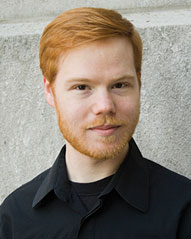 Mr. Laurentiu was an excellent pianist but had less success at the organ. Ms. Ruggieri was excellent in her harp work and the violinists were fine in their part of the program.
Reuben Lillie
Two of the singers are soloists in the choir of St. Paul and the Redeemer Church, where David also sings.
We visited Christkindlmarkt right across the street from the Chicago Temple, where the concert was held. Did a bit of Christmas shopping in this German-traditional marketplace. A chilly interesting afternoon.
Mr. Laurentiu was an excellent pianist but had less success at the organ. Ms. Ruggieri was excellent in her harp work and the violinists were fine in their part of the program.
Reuben Lillie
Two of the singers are soloists in the choir of St. Paul and the Redeemer Church, where David also sings.
We visited Christkindlmarkt right across the street from the Chicago Temple, where the concert was held. Did a bit of Christmas shopping in this German-traditional marketplace. A chilly interesting afternoon.
Finished with a wonderful pizza and salad at Giordano's. Talk about an international day!
Well- I can tell you one thing for sure:Eric Owens has one hell of a bass voice! And I mean that in the most complimentary way. Tonight at the Chicago Lyric Opera's performance of Gershwin's Porgy and Bess, he made William Warfield look like a piker.
 Eric Owens
I heard Warfield, along with Leontyne Price and Cab Callaway in the 1953 revival of the opera in New York City way back when. That's a hard act to follow.
His strong, clear voice, along with excellent diction, and strong dramatic presence, made his performance one I will long remember.
The rest of the cast was very strong both vocally and dramatically. Bess, sung by Adina Aaron, was sung with beautiful tone but poor diction. She seemed bent on coloring vowels in a way that kept you wondering what word she was trying to say.But the sound was lovely and she is a good actress. No Leontyne Price, but then, who is?
Eric Owens
I heard Warfield, along with Leontyne Price and Cab Callaway in the 1953 revival of the opera in New York City way back when. That's a hard act to follow.
His strong, clear voice, along with excellent diction, and strong dramatic presence, made his performance one I will long remember.
The rest of the cast was very strong both vocally and dramatically. Bess, sung by Adina Aaron, was sung with beautiful tone but poor diction. She seemed bent on coloring vowels in a way that kept you wondering what word she was trying to say.But the sound was lovely and she is a good actress. No Leontyne Price, but then, who is?
 Adina Aarons
Hlengiwe Mkhwanazi as Clara, Norman Garrett as Jake, Karen Slack as Serena, Eric Greene as Crown, and especially Gwendolyn Brown as Maria were all excellent. Several chorus sopranos who had solo lines sounded glorious.
The one exception was Jermaine Smith as Sportin' Life. Not only was there not enough voice present in most of the range, he took such liberties with 'It ain't necessarily so' that were vulgar and out of character, that it ruined that number for me. Cab Callaway, all those years ago, sang the socks off this role.
One dramatic touch that was missed here, that I saw in the 1953 production, was at the end, when Bess has gone off to New York with Sportin' Life, and Porgy say he's going to New York to find her. In the earlier production he says 'Bring me my goat!', and a little goat is brought on stage attached to a wagon. He sets off to New York on his knees behind the goat. I always have to cry at that moment.
(In the original productions, Porgy spends the whole opera on his knees on a little wheeled platform that allows him to get around.)
In this production he was on a crutch the whole time, and at the climactic moment said 'Bring me my crutch', and sets out to walk to New York.
I missed the goat!
Ward Stare led the fine orchestra, always keeping a good balance with the singers, which seems to be a CLO thing. I think partly because part of the orchestra pit may be below the stage as in Weimar, which would make the difference.
A very imaginative set by Peter J. Davidson, good costumes by Paul Tazewell, and lighting by Mark McCollough made the production come alive.
The fine chorus, prepared by Michael Black was sensational in the magnificent choral moments.
It was a glorious evening! And that Eric Owens can sing for me any time!!
Adina Aarons
Hlengiwe Mkhwanazi as Clara, Norman Garrett as Jake, Karen Slack as Serena, Eric Greene as Crown, and especially Gwendolyn Brown as Maria were all excellent. Several chorus sopranos who had solo lines sounded glorious.
The one exception was Jermaine Smith as Sportin' Life. Not only was there not enough voice present in most of the range, he took such liberties with 'It ain't necessarily so' that were vulgar and out of character, that it ruined that number for me. Cab Callaway, all those years ago, sang the socks off this role.
One dramatic touch that was missed here, that I saw in the 1953 production, was at the end, when Bess has gone off to New York with Sportin' Life, and Porgy say he's going to New York to find her. In the earlier production he says 'Bring me my goat!', and a little goat is brought on stage attached to a wagon. He sets off to New York on his knees behind the goat. I always have to cry at that moment.
(In the original productions, Porgy spends the whole opera on his knees on a little wheeled platform that allows him to get around.)
In this production he was on a crutch the whole time, and at the climactic moment said 'Bring me my crutch', and sets out to walk to New York.
I missed the goat!
Ward Stare led the fine orchestra, always keeping a good balance with the singers, which seems to be a CLO thing. I think partly because part of the orchestra pit may be below the stage as in Weimar, which would make the difference.
A very imaginative set by Peter J. Davidson, good costumes by Paul Tazewell, and lighting by Mark McCollough made the production come alive.
The fine chorus, prepared by Michael Black was sensational in the magnificent choral moments.
It was a glorious evening! And that Eric Owens can sing for me any time!!
 Davida Karanas
Davida Karanas Amanda Majeski
Amanda Majeski





